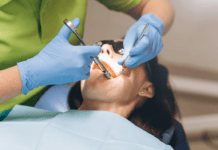General trends in the dental field are leaning towards the increased presence of DSO organizations. A DSO organization is a Dental Support Organization or the corporation of dental offices. Some of the most established DSOs are Heartland Dental, Aspen Dental, and Dental Works. Although the presence of corporate dental offices has increased, private practice offices are still alive and well.
So, the question becomes, which is better to work for? The answer to this question can be determined by examining the pros and cons of both corporate and private practice offices.
Private Practice Advantages
When working in a private practice office, several things are beneficial in this office setting. To start, private practice offices tend to operate like a tight-knit family. This allows for a lot of communication and growth when employed by someone who is respectful and supports your advancement as a hygienist. When the relationships are respectful and positive, the doctor-hygienist or hygienist-hygienist relationships can become a consistent source of constructive criticism and feedback on your strengths.
In addition, private practice offices tend to not focus as heavily on the number of new patients. Although new patients are an imperative aspect of a healthy office, private practice is generally more established, so gaining 50+ new patients is not a primary focus of the team, but providing the existing patients with the most comprehensive treatment possible is. This leads to a consistent and devoted group of patients. These patients have increased patient-doctor trust and are generally more open and susceptible to treatment recommendations.
Private Practice Disadvantages
Although a close group of coworkers can be very supportive, it also comes with its own set of “norms” and possible drama. Often, when people work with each other for a long amount of time, there is history and underlying issues that a new employee can be subject to. In a perfect world, this would not be an issue, but in reality, tight-knit groups can be difficult to try to become a part of. However, with time and patience, this difficulty can be overcome.
The lack of medical insurance and additional benefits also poses a difficulty in the business of private dental practice. It is less common for private practices to provide their employees with a comprehensive benefit package. Although I have found retirement benefits, such as a 401k package, to be offered in my private practice experience, other benefits such as medical insurance, short-term disability, and paid time off have not. These benefits can be extremely beneficial for someone throughout their life.
To add on, the smaller private practices come with an increased responsibility to the schedule. This can make it more difficult to request time off or increased guilt when needing to call out, whether it be for personal reasons or sickness. This can lead to an increased burnout rate.
DSO/Corporate Advantages
Due to the large size of corporate dental offices, they can come with many advantages. Having a larger team and associate offices allow for team members to have the ability to take time off needed for priorities outside of the office. This allows for slightly less stress when these instances occur and the ability to still provide patient care when a team member is unavailable.
Comprehensive benefit packages can be the sole reason why a person will accept a job. For someone like me who is a single, 27-year-old, benefits such as medical insurance, a retirement fund, and disability coverage can have a direct influence on my overall budget, therefore, can steer my career choice.
Corporate dental offices also invest a significant amount of money into continuing education and skill advancement. When the corporation invests in the education of their employees, they are allowing for increased productivity, which leads to increased profit. The result of this is a large network of highly educated dental care professionals. With the large network of colleagues and practitioners, the ability to discuss patient care with other professionals is an easy task.
DSO/Corporate Disadvantages
The corporate dental world can be centered around productivity and the “numbers game.” Although every business needs to be profitable to keep the doors open, it can appear that DSOs focus more strongly on the “bottom line numbers” than a private practice does. Trend analyses, RVUs, and production reports are regular conversations in the corporate dentistry world.
Often times, non-clinical team members can be providing clinical team members with criticism and feedback. As a clinical team member, hearing unrealistic recommendations and critiques from those who are not a frontline dental provider can be extremely frustrating. This can lead to decreased team morale and overall lack of motivation.
One more disadvantage of DSOs is turnover. Due to no one from the clinical team being an owner of the practice, there is an increase in team member turnover. Although there are clinicians that will practice at the same corporate dental office their entire career, this instance is a rarity.
To sum up, both private practice and corporate practice have their respective advantages and disadvantages. Therefore, there is no clear-cut choice in which option is the “better” practicing environment for the dental hygienist. It is the responsibility of the individual to decide on which advantages are most important to them and their lifestyle and choose the appropriate setting for them to thrive in both professionally and personally.












